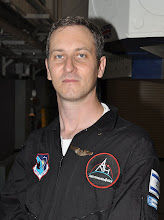In a few days the fiftieth anniversary of Yuri Gagarin's historic orbital flight around Earth will take place. Yuri's Night, as it has been called for a decade now will entail hundreds of parties and events around the world to commemorate that event and the first space shuttle flight twenty years later. Space enthusiasts will collectively remember and celebrate. In fact, this decade will be full of golden anniversaries. However, in some ways, it will also look like a remake of an old movie, the one about rockets and capsules. Most interestingly, perhaps, this decade will be about beginnings and new steps towards space accessibility and use through suborbital and possibly orbital flights.
The 1960s were a special decade for many reasons, one of which was space. John F. Kennedy hasn't made his famous "We choose to go to the moon" speech yet (that would come almost a year and a half later in September 1962) but the space race was already on. Times were simpler in some ways, as there were only two participants in the space race, USA and USSR. The rest of the world watched as the epic match took place, bigger even than the two countries involved, starting with the first man in orbit (or even before, with Sputnik) and ending with the first man on the moon.
As we start celebrating all the events leading to that "one giant leap" in 1969, it seems like we have a need to celebrate partly as a pat on the back, as if we're saying "that's what we are capable of" and "we could do it again if we wanted to". But reality kicks in, and a look at the current US and Russia space programs leaves a lot to be desired. After thirty years of space shuttle flights the US defaulted to a remake of a rocket with a capsule on top. Like every good remake, it would be better than the original, however for several reasons that remake won't even see the light of day, at least not on the NASA side. On the former Soviet side, the Russians still fly pretty much the same Soyuz they did back then. So much for colonies on Mars. At least we have SpaceX and its Falcon 9 rocket which in some ways breaks the rules of traditional government space programs and is showing us how it should be done, even if we're still not going anywhere but low Earth orbit at this point. Space is also no longer today the playground of only two players like it used to be.
The most interesting part of this three-way decade will be the new private space flights. Virgin Galactic and others to follow will start taking people to space (not to orbit and much lower altitude than where the shuttle goes or the international space station hangs out but still beyond 100km altitude). For the first time people will get to space not on a government ordained vehicle and most of those who will get to space this decade will not be trained by or funded by any government. Initially people that can put aside the cost of a house for a joy-ride will go but also scientists and commercial astronauts, ones that will not be representing a specific country. While NASA will have to restructure for the new era one way or another, private companies will continue to develop space hardware and add more ways for people to get to space. Being more accessible, manned spaceflight and research will lead to new discoveries and we may see the first private orbital flights and tourism as well.
In ten years we we will know which of the three parts of this decade will have been more prevalent - the celebrations of past achievements, remaking of old ideas or new, more privatized space access. Hopefully we will have learned from the first, made a better second and used the first two to lay strong foundations for a prosperous third.
2025 Airplane Raffle List
10 months ago

 Space Shuttle Launch Poll Results
Space Shuttle Launch Poll Results













No comments:
Post a Comment